How to start a Highly Profitable blog.
I’m going to kick things off by shining a spotlight on blogging, but not just any kind of blogging. I’m talking about turning words into wealth – making blogging your next profitable business venture. But why blog for bucks? You’re about to find out.You see, blogging has evolved from digital diaries into full-fledged digital storefronts. With the right approach, it’s a platform that can yield a substantial income, providing you’re willing to put in the effort and play the long game. I am going to dive into how to start a highly profitable blog with Wealthy Affiliate.
blogging is Still A Powerful Tool
If your blog speaks directly to a specific group of people and keeps them hooked, it has real potential as an income generator. Bloggers who put out valuable material regularly not only capture reader interest but also establish themselves as trusted voices in specialized topics. This opens doors to earning through avenues including promoting other people’s products (affiliate marketing), partnering up with companies for sponsorships on your platform. Additionally placing targeted ads can generate passive income while offering downloadable guides keeps sales steady too! This alone should motivate you to learn how to start a highly profitable blog.
This opens doors to earning through avenues including promoting other people’s products (affiliate marketing), partnering up with companies for sponsorships on your platform. Additionally placing targeted ads can generate passive income while offering downloadable guides keeps sales steady too!

Which Blogging Platform Is best.
Ultimately, the best blogging platform for you will depend on factors such as your budget, technical skills, desired level of customization, and the specific features you require. Theoretically it’s a good idea to research and compare different platforms to find the one that aligns best with your needs and goals.Having said that WordPress the self hosting free version is fairly intuitive for beginners and it is a lot easier to make money than with Square Space or Wix.
Why Is WordPress Superior to Almost any other platform?
1. You Can Build or Replicate Any Website
WordPress.org offers unparalleled flexibility and customization options. With access to thousands of themes and plugins, you have complete control over your website’s design, functionality, and features. This level of customization is not possible with Wix and Squarespace, which limit you to the options provided within their platform. In other words, they provide you with fixed templates, this gives you very limited options to change.
2. Ownership and control.
Another significant advantage of self-hosted WordPress is ownership and control. When you use WordPress. you have full ownership and control over your website and its content. You can move your website to any hosting provider or server at any time, giving you the freedom to make decisions based on your needs. In contrast, with Wix and Squarespace, your website is tied to their platform, you cannot transfer a website out of their platform.
More Reasons I recommend WP
3. Scaleability.
Scalability is another area where WordPress excels. It is robust enough to accommodate websites of any size or traffic volume, and as your website grows, Wix and Squarespace may have limitations in terms of scalability and performance for high-traffic websites, which can be a significant drawback for businesses looking to expand their online presence.Although Wix offers affordable plans for small websites, the costs can add up as your business grows and requires more advanced features, e-commerce capabilities, or custom functionality.
3. Plugins
Plugins are tiny pieces of code which do things automatically on a WP site. When it comes to SEO and marketing, WP offers better capabilities with the help of plugins like Yoast SEO . These tools allow you to optimize your website for search engines, giving you full control over your website’s structure, meta tags, and other SEO elements. While Wix and Squarespace provide limited SEO features. If you haven’t got eyeballs on your site it will never make money.
Lastly, WordPress benefits HUGELY from a large, active community of developers, designers, and users who contribute to its development and provide support. This means that there are numerous online resources, forums, and tutorials available for WordPress users, making it easier to find solutions to any issues or questions that may arise. While Wix and Squarespace offer customer support, their communities are not as extensive as WordPress.
Wealthy Affiliate Only Allows WordPress sites Because it is the best.
Cost-effectiveness is another factor to consider. Although WordPress requires you to purchase a domain name and web hosting separately, YOU CAN AVOID THESE CHARGES. Wealthy affiliate give you free hosting, a free domain, and the icing on the cake is the AI capabilities. There AI passes an AI detector 100% of the time. In comparison, Wix and Squarespace often have higher monthly or annual costs, especially for advanced features and e-commerce functionality.
so How To Start A Highly Profitable blog.
I love the preliminary steps to start a highly profitable blog, I know that the more I understand the niche I am in the more money I will make. Have a look at this article here about a people first Approach to blogging. Don’t get me wrong I blog for a profit, it is a great way to earn a living. However, money is never my first approach. I look to what people are looking for. Once I have found those answers I have found how to structure my blog to answer those burning questions.
Identifying Your Niche – The Key to Blogging Success
Choosing the right niche isn’t just about following a passion, it’s about finding an intersection where your interests meet the needs of others. Think of it as setting up a shop where there’s demand for what you’re selling.
Start by listing down topics you’re knowledgeable about or have a keen interest in. It’s there, in these topics, that you could potentially offer unique insight and value to a readership.
But your enthusiasm alone won’t guarantee a profitable blog. That’s where market research comes in. Explore forums, social media, and other blogs. What are people talking about? What questions do they have that aren’t being answered?
Your aim is to pinpoint a niche that is neither too broad nor too narrow. Broad topics face fierce competition and can be tough to rank for in search results. On the other hand, a niche that’s too narrow may not have a sizable audience to sustain profitability.
Find out What Keeps Your Readers Up at Night
Join Online Communities
Social Media Groups: Join Facebook groups, LinkedIn groups, and other social media communities related to your niche. Furthermore participate in discussions, observe the conversations, and take note of recurring issues and complaints.
Forums and Subreddits: Additionally. Register on forums like Reddit, Quora, and niche-specific forums. Look for threads where people discuss their problems and challenges. Sites like Reddit have subreddits dedicated to almost every topic imaginable.
Utilize Free Keyword Research Tools
Google Trends: Use Google Trends to identify popular search terms and see what people are searching for in your niche. This can give you an idea of what problems are top-of-mind for your audience.
AnswerThePublic: This tool generates questions and phrases that people commonly search for online, based on a specific keyword. It’s a great way to discover what people want to know about your niche.
Analyze Competitor’s Content
Blog Posts and Articles: Read blog posts, articles, and content published by your competitors. Pay special attention to the comments section where readers often share their pain points.
Reviews and Testimonials: Look at reviews and testimonials on competitor websites, Amazon product reviews, and other review platforms. Identify common complaints and unmet needs.

Crafting Your Blog’s Business Model
Your blog isn’t just a blog it’s a business. And like any good business, it needs a solid business model to guide its growth and secure its profitability. Here’s how you can put together a robust business model for your blog:
When you think of monetization strategies for your blog, understand there’s no one-size-fits-all solution. It starts with defining your value proposition what unique insights, information, or entertainment will your blog provide that makes it worth visiting?
Consider the various ways to generate income. Specifically, display ads, sponsored content, affiliate marketing, selling digital products like e-books or courses, and offering consulting services or paid memberships. Each of these revenue streams comes with its own set of challenges and rewards. A BALANCED approach will help reduce the risk and maximize the potential.
Remember, a business model isn’t stagnant. It’s a dynamic plan that should evolve as your blog grows and as the digital landscape changes. Stay agile and be ready to pivot or scale different aspects of your model when necessary.
Diving deep into each revenue stream, ads and sponsorships are often the first port of call for many bloggers. But caution is advised ads can disrupt user experience if overused. Affiliate marketing, where you earn a commission for promoting other people’s products, can be lucrative, provided you maintain authenticity and trust with your audience.
Growing Your Community: Engagement and Social Proof
I know the excitement of seeing your blog take shape. You’ve picked your niche and set up a viable business model – but now, it’s time to roll up your sleeves because growing an engaged community is your next big goal. An active community not only boosts traffic but also establishes credibility and fosters a sense of belonging among readers, which in turn can significantly enhance profitability.
1. Email Marketing. Begin with email marketing. It’s a high-impact tool for creating a personal connection with your audience. Start by choosing an email service provider that fits your needs, and then offer free, valuable content to encourage visitors to subscribe. Send regular, value-packed newsletters and exclusives that aren’t available anywhere else – this kind of direct engagement can transform casual readers into loyal followers.
2. Social media is another powerhouse for community growth. Choose platforms where your ideal readers spend their time and start building your presence there. Share snippets from your blog, engage with followers in the comments, and use social media ads strategically to increase visibility. Remember, genuine engagement trumps quantity every time. Aim for authentic connections rather than just chasing follower numbers.
Keep your Reader’s Involved.
Lastly, it’s not just about attracting visitors but keeping them involved. Encourage readers to leave comments by asking thought-provoking questions at the end of your blog posts. Consider collaborating with other bloggers through guest posts, both on your blog and others. Engage with your audiences by hosting live Q&A sessions, webinars, or creating a dedicated forum or group for discussions related to your niche. This interactive element can create a thriving community around your blog, paving the way for higher engagement and, ultimately, a more profitable blog.
Now, having sparked interest and initiated conversation within your budding community, what’s the next step? It’s leveraging that community to ensure your blog not only grows in readership but also in relevance and influence. The upcoming section will guide you on harnessing the power of analytics to understand your audience better and make informed decisions to steer your blog in the right direction.
Understanding Analytics to Propel Your Blog Forward.
Understanding the technicalities is part and parcel of how to start a profitable blog. It is crucial to find out where people land on your blog and then what to do when they get there.
Analytics is a blogger’s compass. It points to what’s working and what’s not. Without analytics, you’re blogging in the dark. I’ll show you how I use analytics to turn insights into action, ensuring I’m always heading toward profitability.
Mastering Google Analytics is a MUST. It tells me who visits my blog, how long they stay, and what content keeps them coming back. Learning which articles hook your readers helps in crafting more of what they love.
It’s easy to get lost in numbers, but the key metrics I focus on are traffic sources, bounce rate, and conversion rate. Where visitors come from tells me which marketing efforts are paying off. If the bounce rate is high, I rethink my content or site design. A low conversion rate? It’s a prompt to refine my calls to action.
I’ve learned to be adaptable. The digital world changes FAST. What drew in crowds last month might not this month. Analytics gives that early warning sign, allowing me to pivot quickly.
Lastly, A/B testing is a blogger’s best friend for decision-making. I test headlines, images, and layouts to see what combination drives the most conversions. This is how I ensure I’m not just guessing what works, but KNOWING it.
Monetizing Your Blog: Strategies for Sustainable Income
Once your blog begins to attract a steady readership, it’s important to start thinking about how you can turn your influence into income. A profitable blog isn’t just about great content – it’s also your ability to monetize that content effectively. Here, I’ll discuss the most reliable ways to establish sustainable income streams.
Advertising is a traditional starting point.
First, advertisements can provide a steady revenue. While display ads might detract from the user experience if overused, when placed thoughtfully, they can be a consistent source of income. Partnering with ad networks, like Google AdSense, can simplify this process.
Platforms like Google AdSense allow you to place ads on your blog easily and can generate income based on views and clicks. Affiliate marketing takes this a step up, giving you a commission for products sold through your recommendations. When choosing affiliate products, prioritize relevance and quality to maintain your credibility.
Selling your own digital products—such as eBooks, courses, or webinars—can be a goldmine. These products have the added benefit of enhancing your authority in your niche. Remember, the success of your digital products heavily depends on the quality of content and its value to your audience.
Consulting or coaching services offer another avenue for monetization, particularly if you’re knowledgeable in a field with high demand for expert advice. Tailor your services to the needs of your audience and make sure they align with your blog’s content.
Finally, consider premium memberships or subscription-based content. Offer exclusive, high-quality content that provides tangible benefits and insights beyond what’s available for free. This strategy builds a recurring revenue stream while also reinforcing the value of your blog to your subscribers.
Secondly, there’s affiliate marketing, which involves promoting products or services and earning a commission for each sale made through your unique referral link. Careful selection of affiliate programs that align with your content and readers’ interests is vital for success.
Lastly, consider premium memberships or subscription services for exclusive content. This can foster a sense of community among your readers and provide them with additional value, leading to a reliable monthly income. Remember, it is essential to maintain quality content that keeps your members engaged and justifies the expense of the subscription.
Driving Organic Traffic: SEO and Content Strategies
Understanding the role of SEO for long-term traffic growth. Explaining how keyword research and optimization lead to better visibility on search engines.
Crafting evergreen content that remains relevant and drives consistent traffic. Moreover, outline the importance of quality, relevance, and usefulness in blog posts.
The significance of link building and networking with other bloggers and influencers. Additionally providing actionable tips on how to earn high-quality backlinks.
Utilizing social media and email marketing to bolster organic reach. Discussing strategies to share content effectively and drive traffic back to the blog.
Emphasizing the need for regular updates and content refreshes to maintain and improve SEO rankings. Advising on how to keep old content from becoming outdated.
How to Start A Highly Profitable Blog Conclusion
You’ve now got the insights that can spark the journey of creating a highly profitable blog. Harnessing this knowledge effectively hinges on maintaining focus and applying the strategies outlined.Recall the importance of continually learning and adapting. Online trends shift, and what works for monetization evolves, so stay informed and flexible.Remember, building a profitable blog doesn’t happen overnight. Instead, It’s the consistent, quality effort that pays off. Set realistic milestones and celebrate your progress.











Thanks for writing this useful information, can you recommend some profitable niches please
Richard, if you type milliondollarattachecase.com into the address bar, you will see a search button. Type in niche and all the blogs that cover everything about niches will come up. Here is one as an example https://milliondollarattachecase.com/choosing-a-profitable-niche-for-online-entrepreneurs-a-step-by-step-guide/. It covers choosing a profitable niche. That is the core basic choosing a profitable niche
I can’t agree with you here, the blogging space is too cluttered and too overcrowded. It is insane to try and start a profitable blog now.
Amazing article full of inspiration. You almost changed my mind, yet I still think that blogging is dead, too many people are doing it. Are you sure you are not just trying to get a profit.
Hello Oomy. Many friends in WA earn five-figure sums a month from blogging. It is not a get rich scheme. Wealthy Affiliate teaches people to build PROFITABLE I mentor them to create sustainable income streams. it is a simple predictable to earn a living.
I have tried affiliate marketing many times, and I have never made any money, what do you say to that?
I have read your blog post with interest and I have a question, please? I have a Shopify web site and the fees are crippling me, can I use Wealthy Affiliate hosting and transfer the shopify site.
Hello Hamish
Shopify and WordPress are distinct platforms tailored for different purposes. Shopify is a dedicated e-commerce solution designed for creating and managing online stores. It is a hosted platform, offering user-friendly tools and templates that make it easy to set up a store without technical expertise. Shopify provides comprehensive e-commerce features like inventory management, payment gateways, and shipping options, all backed by 24/7 customer support. Its customization options, though robust, are somewhat limited to the templates and apps within the Shopify ecosystem.
In contrast, WordPress is a versatile content management system (CMS) used for building various types of websites, including blogs, business sites, portfolios, and online stores (when integrated with plugins like WooCommerce). WordPress is self-hosted, requiring users to manage their own hosting. While it offers extensive customization and flexibility through thousands of plugins and themes, it can be more complex for beginners. WordPress excels in creating content-rich sites and provides a vast community for support, though without centralized assistance like Shopify.
What you can do is build your Shopify site in WP using Woo commerce theme, which is not stable, or you can use Thrivecart. Thrive cart is not free but it is a one off payment
I have not got any social media accounts will I still be able to create a profitable blog?
Hi Jerry
Building a successful and profitable blog is more of a marathon than a sprint. When you start, the first thing you do is create content. Later you need to market it, but there are loads of tutorials within Wealthy Affiliate so take it one step at a time
Hello Catherine
I would love to start a blog, but I am very worried about selecting a niche, the whole thing seems such a big step.
Steve
Your first step is to start a free taster account at Wealthy Affiliate. You don’t need any credit card information, and when it says it is free, it is. Once you have a free account on your dashboard, there is a niche finder on the left. In this, you put in your interests and it gives you suggestions. Let me know if you need any more help
I want to create an online store, am I better doing it on Shopify or WP